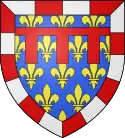
Charles of Durazzo (Italian: Carlo di Durazzo 1323 – 23 January 1348) was a Neapolitan nobleman, the eldest son of John, Duke of Durazzo and Agnes of Périgord.[1]
Life
He succeeded his father as Duke of Durazzo and Count of Gravina in 1336.
On 21 April 1343, he married Maria of Calabria, Countess of Alba, in Naples.[1] She was the younger daughter of Charles, Duke of Calabria and sister of Joan I of Naples, and had been intended as a bride for Louis I of Hungary or John II of France, but was abducted by Charles and his mother to make a marriage that would place Charles closer to the throne of Naples.
Keeping carefully aloof from the conspiracy that murdered Joan's husband Andrew, Duke of Calabria, he led a faction opposing Joan and Louis of Taranto. He contacted the Hungarian court, seeking their support. He hoped to turn the invasion of Louis of Hungary and the flight of Joan to his own ends: but he was seized and beheaded by the Hungarians at Aversa.[2]
Issue
Charles and Maria had:
- Louis (December 1343 – 14 January 1344)
- Joanna (1344–1387), Duchess of Durazzo;[1] married first in 1366 Louis of Navarre, Count of Beaumont (d. 1372), married second Robert IV of Artois, Count of Eu (d. 1387)
- Agnes (1345–1383,[3] Naples),[1] married first on 6 June 1363 Cansignorio della Scala, Lord of Verona (d. 1375), married second James of Baux (d. 1383)
- Clementia (1346–1363, Naples)[1]
- Margaret (28 July 1347 – 6 August 1412),[1] married in February 1368 Charles III of Naples
References
- 1 2 3 4 5 6 Zacour 1960, p. 32.
- ↑ Bartlett 2020, p. 248.
- ↑ Topping 1975, p. 149.
Sources
- Bartlett, Robert (2020). Blood Royal: Dynastic Politics in Medieval Europe. Cambridge University Press.
- Zacour, Norman P. (1960). "Talleyrand: The Cardinal of Périgord (1301–1364)". Transactions of the American Philosophical Society. New Series. American Philosophical Society. 50 (7): 1–83. doi:10.2307/1005798. JSTOR 1005798.
- Topping, Peter (1975). "The Morea, 1364–1460". In Setton, Kenneth M.; Hazard, Harry W. (eds.). A History of the Crusades, Volume III: The Fourteenth and Fifteenth Centuries. Madison and London: University of Wisconsin Press. pp. 141–166. ISBN 0-299-06670-3.